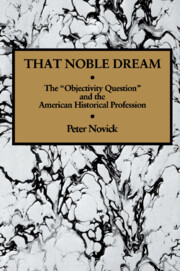Book contents
- Frontmatter
- Contents
- Preface
- Introduction: Nailing jelly to the wall
- I Objectivity enthroned
- II Objectivity besieged
- III Objectivity reconstructed
- IV Objectivity in crisis
- 13 The collapse of comity
- 14 Every group its own historian
- 15 The center does not hold
- 16 There was no king in Israel
- Appendix: Manuscript collections cited
- Index
13 - The collapse of comity
Published online by Cambridge University Press: 29 March 2011
- Frontmatter
- Contents
- Preface
- Introduction: Nailing jelly to the wall
- I Objectivity enthroned
- II Objectivity besieged
- III Objectivity reconstructed
- IV Objectivity in crisis
- 13 The collapse of comity
- 14 Every group its own historian
- 15 The center does not hold
- 16 There was no king in Israel
- Appendix: Manuscript collections cited
- Index
Summary
The mood of affirmation and consensus which dominated American society from the early 1940s to the early 1960s had been, on the whole, congenial to an objectivist posture. Scholars celebrated the end of seriously divisive conflicts in the era of the “end of ideology.” With agreement not only on ends, but to a considerable extent on means as well, residual problems were largely technical, objectively soluble through expertise. Historians' objectivism was usually qualified and tolerant. For various reasons, including the strictures of the interwar relativists, there had been, in these years, somewhat diminished confidence that historians' interpretations would converge on a single Truth, but every reason to believe that the boundaries of disagreement would continually narrow. For practical purposes, so long as historical accounts remained within these limits a certain amount of perspectival relativism could be tolerated without abandoning a larger commitment to objectivity. This was a philosophically makeshift, but psychologically and sociologically appealing, stance: why should one jeopardize professional comity by loudly insisting that one's own version was the objective truth and that one's colleague's version, which differed only in emphasis and nuance, was biased or partisan?
During the decade of the sixties the ideological consensus which provided the foundation for this posture collapsed, and it was not to be reconstructed in subsequent decades. The political culture lurched sharply left, then right; consensus was replaced first by polarization, then by fragmentation; affirmation, by negativity, confusion, apathy, and uncertainty.
- Type
- Chapter
- Information
- That Noble DreamThe 'Objectivity Question' and the American Historical Profession, pp. 415 - 468Publisher: Cambridge University PressPrint publication year: 1988

